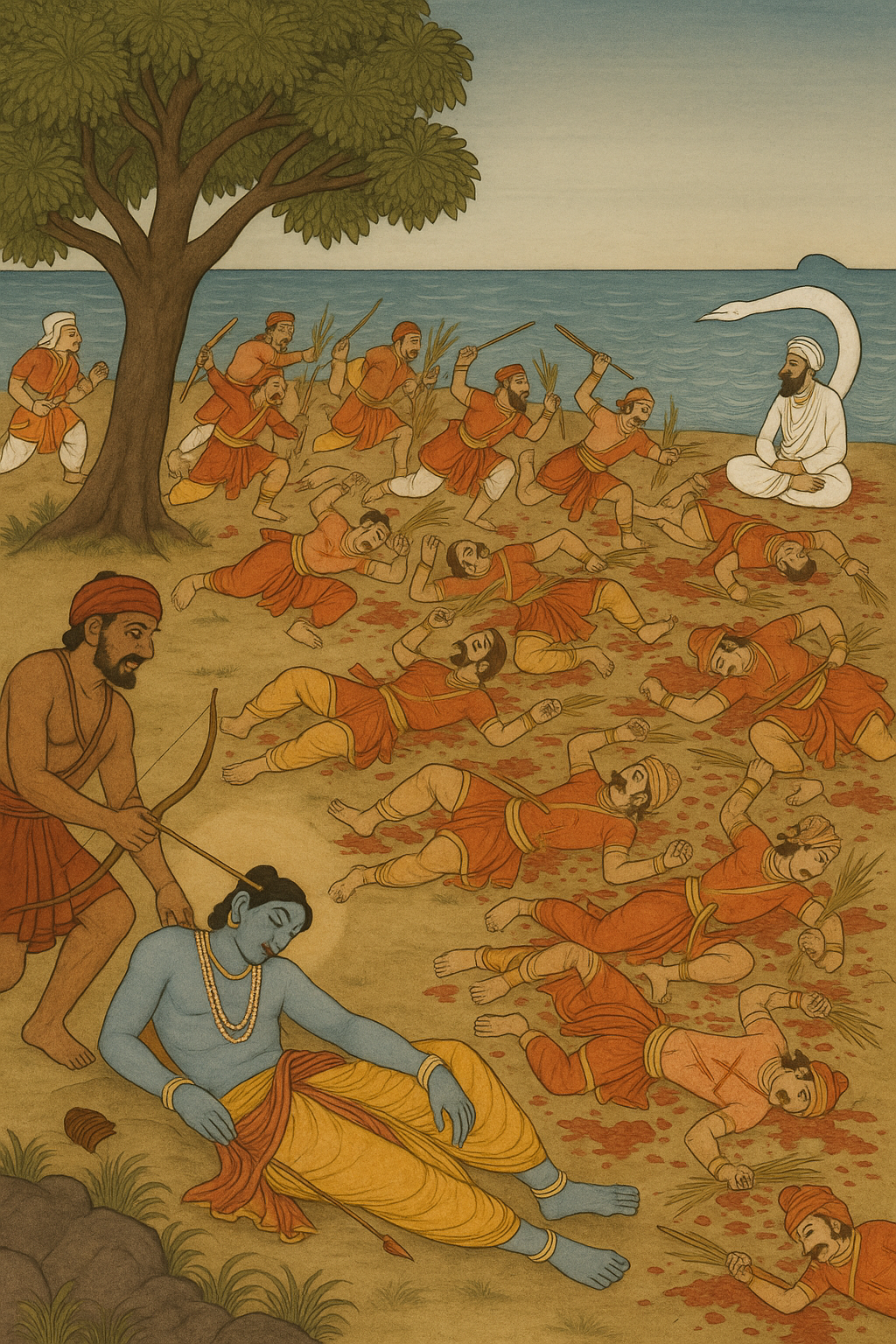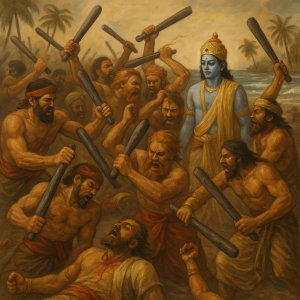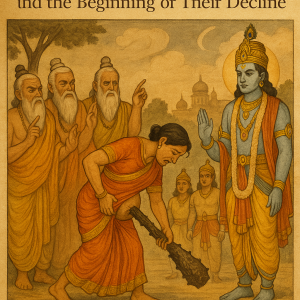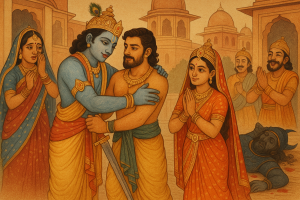The Fading of the Yādava Dynasty
After the many victories, pastimes, and divine manifestations of Lord Kṛṣṇa in Dvārakā, a time arrived—ordained by destiny—when the curtain would fall on the Yādava dynasty.
This was not due to weakness or external enemies, but the mysterious plan of the Supreme Lord, who had descended to fulfill the burden of the Earth and would now return to His eternal abode.
The Yādavas, powerful and proud, began to quarrel among themselves. Signs of ill fate were everywhere: omens in the sky, disturbed animals, and restless sages. Knowing what was to come, Kṛṣṇa guided them to Prabhāsa-tīrtha, the sacred place near the ocean, for one final yajña and purification.
Pilgrimage to Prabhāsa-tīrtha
Kṛṣṇa assembled the elders, ministers, warriors, and sons of the Yādava race. He said:
“Let us all go to Prabhāsa, the holiest of tīrthas, and perform yajñas, take sacred baths, and offer daṇḍa-dāna (charity and penance) to ward off these rising calamities.”
The entire clan, including Ugrasena, Balarāma, Sāraṇa, Sāmba, Pradyumna, and others, departed from Dvārakā with joy and song, unaware of the full weight of destiny awaiting them.
Upon reaching Prabhāsa, they bathed in the holy waters, made offerings, and gave abundant charity to brāhmaṇas and sages. The devas and pitṛs (forefathers) were pleased, and blessings rained from the heavens.
The Curse of the Sages Fulfilled
Long before this, a group of young Yādavas had foolishly mocked revered sages like Viśvāmitra, Nārada, and Kanva by dressing Sāmba as a pregnant woman and asking what child she would bear.
Insulted, the sages cursed:
“He shall give birth to an iron club that will destroy your entire race!”
Though the iron piece was ground into powder and thrown into the sea, destiny cannot be cheated. From the powder grew sharp grass blades along the shore, and one remaining piece formed a solid pestle-like iron rod.
The Drunken Quarrel and Fratricide
At Prabhāsa, after days of yajña and festivity, the Yādavas drank heavily. Drunk with wine and arrogance, they began to argue, boasting of past victories.
Words turned to anger, and soon the grass blades were grabbed as weapons. The cursed iron sprouted from their hands, and they began to slaughter one another—brother against brother, friend against friend.
Pradyumna, Sāmba, Sāraṇa, and many others perished in that terrible massacre. The shore was stained with the blood of heroes.
Balarāma, heartbroken, withdrew to the seashore and sat in deep meditation. From His mouth emerged a massive serpent form—Ananta Śeṣa—who departed toward the sea. Thus, Lord Balarāma returned to His eternal form.
Kṛṣṇa’s Final Moments on Earth
Kṛṣṇa, having witnessed the destruction of His dynasty, walked alone into the forest, absorbed in deep thought. He lay beneath a tree, resting.
At that moment, a hunter named Jara, seeing the Lord’s reddish foot from afar, mistook it for a deer and shot an arrow.
As he approached, he saw the divine form of the Lord and fell at His feet in terror and remorse.
But Kṛṣṇa smiled, full of compassion:
“Do not fear. You have played your part in My divine plan. Return without sin.”
Having completed His earthly mission, Kṛṣṇa withdrew His pastimes. His spiritual body shone brightly, and He returned to His eternal abode—Goloka Vṛndāvana—where He eternally enjoys with Rādhārāṇī and the gopīs.
The Departure of the Devotees
Soon after, Arjuna came to Dvārakā. Finding it empty and ruined, he was overwhelmed with grief. He performed the last rites for the Yādavas and escorted the surviving women and children to safety.
But even his strength began to fade—as Kṛṣṇa’s external presence had departed. Arjuna realized the truth:
“Without Kṛṣṇa, I am powerless. He is the strength of the strong and the wisdom of the wise.”
Dvārakā then submerged into the ocean, as foretold, vanishing from the eyes of the world.
Lessons to Be Learned:
- Even the most powerful dynasties fall when pride and offense take root.
- Pilgrimage and charity cannot nullify destiny if arrogance and insult to saints continue.
- The Lord departs not out of defeat, but to fulfill the final portion of His līlā and return to His eternal home.
- True protection lies not in armies, but in surrender to Kṛṣṇa’s lotus feet.
- The devotee’s strength is only as strong as their connection to the Lord.
Origin of the Story: Harivaṁśa Purāṇa – Viṣṇu-parva, Chapters 97–104



